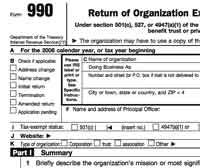In 2008, the IRS commenced a multi-year project to assess UBIT compliance by colleges and universities. The IRS sent out questionnaires to 400 randomly selected institutions and, based on the responses, selected 34 institutions for audit. Released in 2013, the Final Report analyzes the results of the questionnaires and examinations conducted as part of the Compliance Project. In general, the IRS found significant underreporting of UBIT. While the Compliance Project discussed in the Final Report deals exclusively with colleges and universities, the compliance issues uncovered by the audits may be instructive  to other exempt organizations as well.
to other exempt organizations as well.
This article summarizes the highlights of the Final Report concerning the UBIT. Succeeding posts will examine in greater detail the most common compliance errors made by colleges and universities in determining UBTI.
Of the 34 institutions selected for audit, a whopping 90% had increases to UBTI, including more than 180 adjustments representing about $90 million in unpaid taxes. More than one half of the adjustments involved the following activities:
- Fitness and recreation centers and sports camps
- Advertising
- Facility rentals
- Arenas
- Golf courses
The adjustments related not only to the underreporting of income from unrelated trades or businesses but also to excessive losses and net operating losses. Over $600 million losses and NOLs were disallowed on 75% of the examined returns.
Note: The colleges and universities were selected for examination because responses to their questionnaires indicated potential noncompliance on UBIT issues. Thus, the institutions audited are not a representative sample of all colleges and universities. The Final Report cautions that the results apply only to the institutions examined and should not be generalized as representative of other colleges and universities.
The most common adjustments made in the examinations involved the following issues:
- Misclassification as a trade or business due to lack of profit motive
- Misallocation of expenses between exempt and nonexempt activities
- Errors in computation or substantiation of NOLs
- Misclassification of unrelated activities as related activities
- Failure to seek professional advice about the treatment of potentially unrelated activities
In Part 2 of this article, we will discuss how an exempt organization might underreport UBTI as a result of misclassifying an activity lacking a profit motive as a business activity subject to the UBIT.

